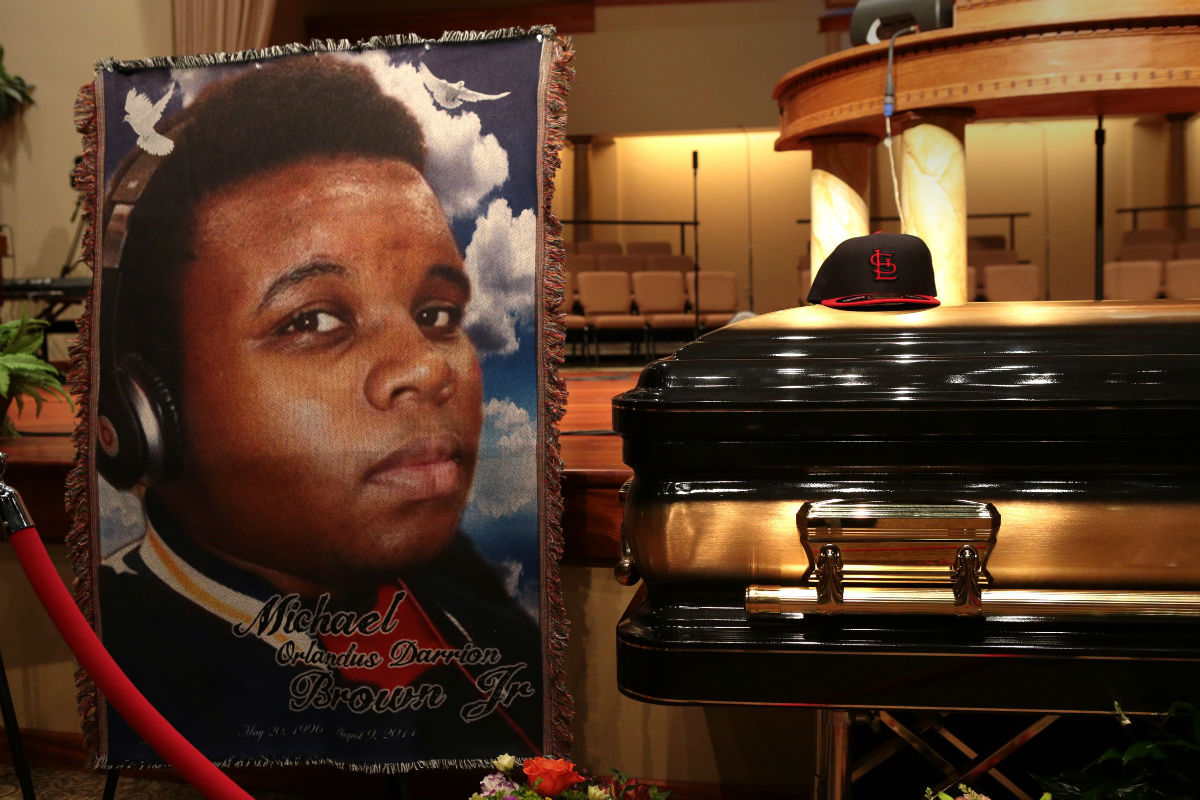[ad_1]
Thursday marks the four-year anniversary of the fatal police shooting of unarmed teenager Mike Brown in Ferguson, Missouri.
Brown’s death at the hands of Darren Wilson ignited immediate national outrage, and little information was offered as to what exactly happened between Wilson and Brown, 18, who was just a few days away from starting college, on the afternoon of Aug. 9, 2014.
The Ferguson Police Department had withheld Wilson’s name, saying at the time that he “was hit” by Brown and that the “side of his face was swollen,” according to The Washington Post.
Protesters, who wanted Wilson charged with murder, clashed with the predominately White police force, who donned riot gear and threw tear gas and shot crowds with rubber bullets. 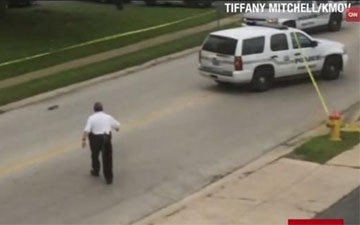
The aftermath of the violence spotlighted a startling truth about the St. Louis suburb of 21,000 people: Brown’s death was seen as the straw that broke the camel’s back because the small city had been wrought with racial tension for years.
Two-thirds of Ferguson’s population was Black, despite White people being the majority in most cities of St. Louis County. The changing racial demographics revealed that law enforcement officers displayed racial bias toward the city’s Black residents.
African-Americans in Ferguson were often targeted through policing practices meant to generate revenue and were pulled over at a disproportionate rate than Whites, according to a 2015 report by the Department of Justice Civil Rights Division.
“Officers violate the Fourth Amendment in stopping people without reasonable suspicion, arresting them without probable cause, and using unreasonable force. Officers frequently infringe on residents’ First Amendment rights, interfering with their right to record police activities and making enforcement decisions based on the content of individuals’ expression,” according to the report.
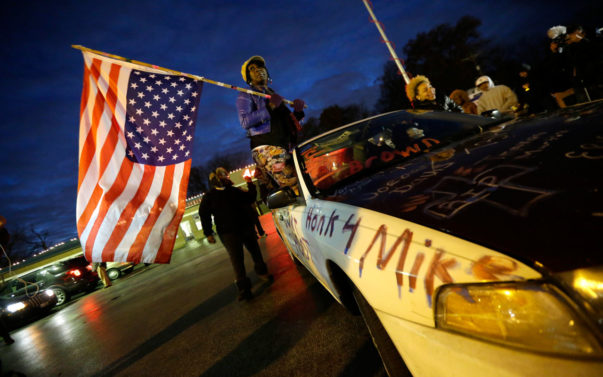
AP / Charlie Riedel
Wilson faced possible charges of first-degree murder and manslaughter, but on Nov. 24, 2014, a grand jury failed to indict him. Protests erupted in cities across the country, with many blaming St. Louis’ lead prosecutor, Bob McCulloch, who didn’t press the grand jury to charge Wilson, according to Quartz.
Brown’s parents, Michael Brown Sr. and Lesley McSpadden, expressed disappointment with the grand jury’s decision but urged people not to resort to violence but instead work together to dismantle a system that led to the ruling:
“We are profoundly disappointed that the killer of our child will not face the consequence of his actions. While we understand that many others share our pain, we ask that you channel your frustration in ways that will make a positive change. We need to work together to fix the system that allowed this to happen. Join with us in our campaign to ensure that every police officer working the streets in this country wears a body camera. We respectfully ask that you please keep your protests peaceful. Answering violence with violence is not the appropriate reaction. Let’s not just make noise, let’s make a difference.”
Following the lack of an indictment and nationwide outrage, then-President Barack Obama recognized the racial implications of the grand jury’s decision but said it should be respected.
“We are a nation built on the rule of law, so we have to accept this decision was the grand jury’s to make,” Obama said in a speech. “In too many parts of this country, a deep distrust exists between law enforcement and communities of color.” He added, “There’s never an excuse for violence.”
Wilson resigned from his position following the grand jury’s decision.
Brown’s death helped propel the Black Lives Matter movement, founded after the 2012 killing of Florida teenager Trayvon Martin at the hands of George Zimmerman, to national prominence.
The mantra “Hands up, don’t shoot,” which stemmed from witnesses’ claims that Brown had his hands up and was surrendering when he was shot, was adopted by BLM and used as a rallying cry for police accountability.
There have been many prominent tragedies involving Black people and law enforcement since Brown’s death.
Sandra Bland, a Black woman, was pulled over for a traffic violation, arrested and died on July 13, 2015, by suicide in a Waller County, Texas jail cell, according to official reports.
Bland’s family and activists disagreed with the claim that she killed herself and wanted law enforcement to be held responsible, but a grand jury failed to indict anyone in connection with her death, despite the Texas Commission on Jail Standards saying that guards violated the jail’s policies to timely check on inmates, according to reports.
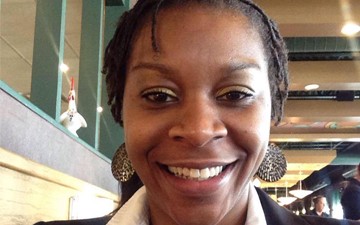
Sandra Bland
The following year saw two high-profile deaths of African-American men by law enforcement that gained national attention and spawned protests for police accountability.
Alton Sterling was shot and killed by police officers in Baton Rouge, Louisiana, on July 5, 2016, after he was selling CDs outside a convenience store.
The Justice Department declined to file charges against the two officers in May 2017 and in March, Louisiana Attorney General Jeff Landry said the state would not prosecute Blane Salamoni and Howie Lake II after determining they “were justified in their use of force.”
On July 6, 2016, Philando Castile was killed by a Minnesota cop in front of his girlfriend and her 4-year-old daughter after he was pulled over and went to reach for his license. His death was captured on video by his girlfriend and posted on Facebook.
Officer Jeronimo Yanez was charged with second-degree manslaughter and endangering safety by discharging a firearm but was acquitted on both counts by a Minnesota jury in 2017.
“While the calls for police accountability has grown since the murder of Mike Brown, few police officers ever face trial for shooting deaths, let alone are convicted,” activist Zellie Imani told EBONY. “Police accountability isn’t body cams or access to dash cam footage. Police accountability is direct control over an institution that affects our lives.”
Ramifications from Brown’s death has been felt far and wide. His family received a $1.5 million settlement with the city of Ferguson in 2017 after filing a wrongful death suit, according to NBC news.
Almost four years to the day, McCulloch, who served seven terms as St. Louis County’s lead prosecuting attorney and was criticized for his handling over Brown’s death, was defeated on Tuesday by councilman Wesley Bell, who ran on reforming the prosecutor’s office, in the Democratic primary race.
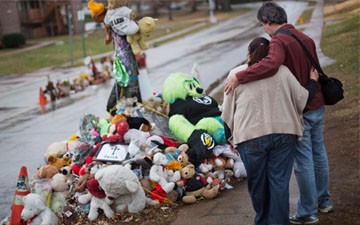
Memorial for Mike Brown.
On Wednesday, Brown Sr. was joined by organizers to honor the memory of his son at a makeshift memorial on the site where he was killed, according to the St. Louis Dispatch.
“This is where everyone came together, stood together and stayed together,” he told the Dispatch. “They hurt together, they persisted together, they loved together. They bonded as family. Hopefully, that love can spread out of here and bring love to all of St. Louis.”
[ad_2]
Source link

